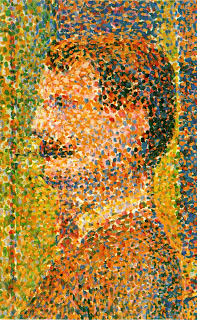In December 1997, the Wichita Symphony welcomed its first woman as guest conductor. Joann Falletta, Music Director of the Long Beach (CA) and Virginia Symphonies, took the podium. During her stay in Wichita, she took time from her schedule for an interview with KMUW-FM's John Clare. You'll have to imagine the music that was played, and the music in their voices as they discussed their mutual love of classical music. The live interview was originally broadcast on 12/3/97 during The Music Room on KMUW-FM 89.
JC: I'm John Clare. I'm joined today by Maestro - is it Maestro or is it Maestra Joann Falletta? We'll start off with a hard question. (laughter)
JF: Either one is ok, and I've been called both, and it doesn't matter. I've never exactly figured out myself which is really correct. (laughter)
JC: Maestro, Maestra, Concertmaster, Concertmistress. It's a hard question. Doesn't really matter except that you're here to lead the Wichita Symphony Orchestra this weekend. We picked the Hailstork to play because you've had some workings with him.
JF: Yes, I know Dolph very well because he lives with us in Virginia, and the Virginia Symphony has played a lot of his music, a lot of premieres of his music, and we're very proud of him. I was just delighted to hear that you knew of his music as well!
JC: Yeah, it's a work on the Albany-Troy label. They certainly put out a lot of contemporary music, especially American music. I wanted to ask you about Carnegie Hall. The Virginia Symphony, of which you're Music Director (as well as the Long Beach Symphony in California we'll talk about each a little later,) made their Carnegie Hall debut earlier this year. I have a quote here that says, " The New York Times says about Joann Falletta "She brought a lovely sweep to the Elgar and enlisted not only a rich, warm string sound but also superbly detailed wind and brass playing.'" Pretty high mark for the New York Times.
JF: We felt very lucky. (laughter)
JC: Why is Carnegie Hall such a mecca for classical music?
JF: Well, I think it's the history of the hall and you're right, it is a mecca because for us in Virginia, the idea that we'd go to Carnegie for the first time after being an orchestra for 75 years, was the very biggest arts news that we could have, going to Carnegie Hall. And I think the sense we had when we were on the stage was that we were joining the spirits of the great musicians who had been there before. And that was an incredible sense! To be on the same stage as Tchaikovsky, and Mahler, and Toscanini � it was fabulous. And for us it was a night I guess that we will never duplicate again. It was a wonderful night and very successful, especially in terms helping our community in Virginia realize where their orchestra had come and that's really why we went, not so much for the New York audiences but to let our hometown know about us.
JC: How about balancing two coasts and conducting two orchestras? California and Virginia obviously aren't close.
JF: They are so different. The communities are so different. Southern California and southern Virginia- they're polar opposites I guess! But I find it very stimulating, you know I've gotten used to the travel back and forth and it's not so bad. The stimulation of being in different communities has been wonderful, very challenging and I've learned a great deal. So I really love the mix of those two places.
JC: And guest conducting, is that something that fits into your schedule?
JF: I spend probably a quarter of my year guest conducting and I like it. It's something very refreshing in a way. Because when you're a music director you have in addition to the musical responsibilities, lots of other responsibilities to worry about: whether we're meeting payroll, and if the tickets are selling and all kinds of extraneous problems that come along with music directorship. When you guest conduct, you have a wonderful artistic week, you know you go in and for that week you're able to just concentrate on the music and not so much of the other problems that we deal with. Plus I find that every orchestra I work with, I learn a great deal and that's true with the Wichita Symphony. My being on the podium in front of an orchestra like that, helps me learn a lot. I don't know if the musicians are always aware of that, but listening to them play the Eroica Symphony is a wonderful experience and a very enriching one.
JC: I have friends who are music teachers and they'll substitute, and have kids who are on questionable behavior; does it ever happen that a guest conductor shows up and the musicians are on their best behavior, or they're trying to get away with something, or that there is a second violinist in the back, slacking off?
JF: You know, I always find that they're actually on their best behavior and I think its because you're someone new to them and they're new to you, and we all want to make a good impression. Frankly, I want to make a good impression with them and vice versa. So, it's usually a delightful experience and I certainly found that with the Wichita Symphony, they're superb and willing to work very, very hard.
JC: I found another quote. I'm a "web-head" and found this on one of the orchestra webpages. It says "One of my goals has been to have the orchestra achieve it's own unique personality. The Virginia Symphony has become the leading musical force in the region, acclaimed for drama, virtuosity, color and finesse. Our musicians play a wide variety of repertoire with flair, excitement and depth." Those are certainly striking words and how does one achieve a unique personality? I know with recordings you can say, "Oh, that's Cleveland and George Szell or that's Montreal and Charles Dutoit." How does one achieve that on the podium?
JF: Well, you need to spend a lot of time with the orchestra, and I think we don't always see that with music directors. But if you can spend time, you can help them really blossom into an orchestra with a unique personality and I think in Virginia they have. We have very talented musicians working together and encouraging risk taking, which for me is very important. Encouraging them always to go for it, you know, not to take the easy way but to try. But I think they've developed a very dramatic sense, they've expanded their dynamic parameters, where they can play great dynamic contrasts - they've become very flexible in tempo changes and rubato. All of this takes time. It takes trust on both of our parts, I have to trust them, they have to trust me, so that the wonderful thing about being music director, is that you really feel you can build something and that that you can create something and help something become better and better for your community and thats a tremendous satisfaction.
JC: You brought in a stack of recordings, and I had known of some. You had worked with the Women's Philharmonic, and not only were they critically acclaimed, but widely talked about. Where does one learn about women composers?
JF: You know, when I first started to work with the Women's Philharmonic I'm embarassed to say, I knew almost nothing about women composers because my training was traditional. You know, I studied at Juilliard and learned a great wealth of music, but none of women. Much of it is contemporary but also women of the past. I think the Women's Philharmonic has really tried to spread the word about that; tried to get the word out to other orchestras in the country because our hope is that they will learn about this repertory and play it. And the recordings have certainly helped that.
JC: I want to talk about a little about a scary topic, new music. Folks may not know, I consider Piazzola sort of a Vivaldi, there's a wealth of works: tangos, chamber works, and just all types. Can you talk about the piece you'll perform of his? [Tangazo]
JF: I'm so glad you asked about him, because I would hate for people to think that this was going to be one of the wild contemporary pieces that they don't want to hear, it's extraordinary tango music. Piazzola, who died in 1992, was in his time, the creator of the Neauvo Tango or the New Tango. He took the form of tango, which is the sort of quintessential Argentine music, and breathed new life into it, brought it into the 20th century with more complicated rhythms and some dissonances. It's still very much a tango and for him the tango was the poor people of Argentina. It was sad and tragic, music people who were disenfranchised, immigrants who had left South America, left their families and homes, and that sort of, kind of tenderness and sadness is what makes the tango so exquisite.
JC: It's sort of an elegant passion. I like to consider that it has that South American touch, it takes you back to the 1920's Paris.
JF: Yes, exactly! It's gorgeous. And of course, most of his music is not for symphony orchestra, rather including pieces for small ensembles, including the Bandeon, which was his instrument, a sort of accordion, which was so much the sound of the tango. But Tangazo, the piece we're playing, is the only one of his pieces for orchestra alone. So it's a little gem that we can now work into the orchestra repertoire, and most people wouldn't have heard it. I think they'll come away just delighted with, as you say, the "elegant passion" of his music.
JC: During the break we talked about Morton Gould and I wanted to talk about commissioning new works. Now you've commissioned Hailstork for the Piano Concerto?
JF: Yes, we took that to Carnegie Hall. But we've done a lot of commissioning, especially in Long Beach, where one of our missions there is to promote American music. So we've done a lot of new music and our audience has really come along with us, and I think they've become very sophisticated. Of course we do a lot of traditional music as well. But I like the mix of combining something new with something like Beethoven, because I think it gives a sense that the symphony is constantly evolving, it's not a musuem of the 18th and 19th century. It's an ongoing beautiful instrument that composers are writing great music for today.
JC: How does one get out of the overture, concerto, symphony mold?
JF: Well, it's hard, you know, but the mold isn't so bad, because...it works! There is something very good about tradition. But we must try to vary what we do, so that it's not always the same thing. And we've found our audiences have enjoyed that and they've come to listen to Piazzola, even if they haven't heard him before.
JC: I read that you're a guitarist and that you went to school at Juilliard. And recently you've made some transcriptions for guitar of some Schubert songs?
JF: It was just released, last week in fact - a guitar transcription of Schubert Winterreise. Schubert was a guitarist, I don't know how many people knew that, a pianist and guitarist. He did a lot of his composing, for the much suited instrument, since that was his inspiration. And so I brought them back, I think, to the guitar that might have been in his mind when he was composing Winterreise. It's a very intimate cycle as well. I think it works very well, Schubert songs are a very special kind of music and the closeness, the gentleness and intimacy of the guitar really gives them a different quality.
JC: Do you still perform guitar?
JF: I still do. Especially chamber music, and for me its a nice foil to conducting, which involves a lot more people and different repertoire.
JC: What about playing and conducting? Have you played the famous Rodrigo while on the podium?
JF: I haven't tried the Rodrigo that way, I've done Vivaldi that way. It seems a lot easier, you know, you can sort of conduct by nodding and body motion...(laughter)...but it's fun. We've got so many years of great music.
JC: While there are many women composers, women conductors are just starting to appear more frequently. What advice would you give to somebody, male or female, who would want to pursue conducting?
JF: Well, it's the kind of profession that requires a lot of study. I'd advise them to work on every other aspect: piano, analysis, score reading, ear training, music history; all of those are very critical. And conducting is the kind of profession that developes very slowly because you learn as a conductor when you practice your instrument - and that instrument is a very expensive instrument you don't always have. I think conductors learn as they go on. I myself am looking at Beethoven Three now, I feel very differently about it and hopefully see a lot more in it than I saw in it at school in Juilliard. So you learn more about a piece and in a way, you get closer to the core of what the piece means. But some people say a conductor isn't a full fledged conductor until he or she is fifty, because it takes that much life experience and musical experience to really come to understand what these pieces are about.
JC: I'd like to thank you very much for coming in today and spending a little time with us.
JF: Thank you. It was a pleasure, thank you!
This interview was broadcast at 2 p.m. Friday, March 13th, 1998 as part of Wichita In Performance, along with the selections Falletta conducted with the Wichita Symphony Orchestra, on KMUW-Wichita, FM-89.
 There's alot afoot in new music, especially for a dear friend of mine.
There's alot afoot in new music, especially for a dear friend of mine. January 17th is the World Premiere of The Singing Rooms, written for violinist Jennifer Koh - and maybe the first Violin Concerto with orchestra and chorus!
January 17th is the World Premiere of The Singing Rooms, written for violinist Jennifer Koh - and maybe the first Violin Concerto with orchestra and chorus! I just got word today that it will be supported by Meet The Composer, thanks!!!!
I just got word today that it will be supported by Meet The Composer, thanks!!!! I just got word today that it will be supported by Meet The Composer, thanks!!!!
I just got word today that it will be supported by Meet The Composer, thanks!!!! Looking forward!
Looking forward!






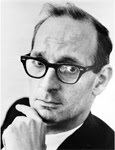
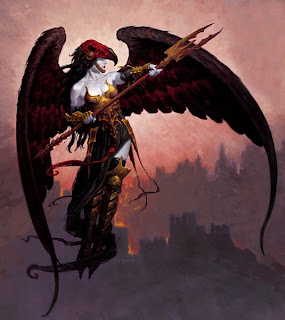



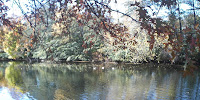
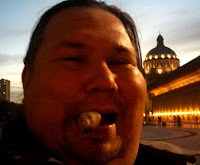
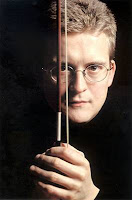

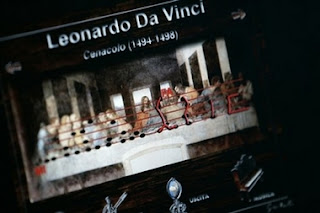 Music in DaVinci's Last Supper? Check out the story
Music in DaVinci's Last Supper? Check out the story 
